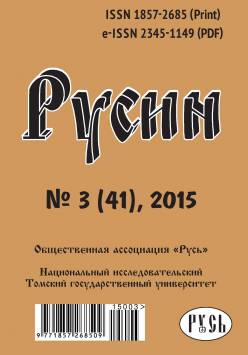International Exchange: The Adaptation of Foreign Students in the Learning Process in the Russian University System (a Case Study of Tomsk State University of Control Systems and Radioelectronics)
The article focuses on the multi-ethnic environment of the University, which reflects both multi-vector global and local processes and specificity of educational practices affecting the relationships in the University eco-environment. The authors consider the processes of adaptation of international exchange students in Tomsk State University of Control Systems and Radioelectronics (TUSUR) and the importance of intercultural interaction within these processes. Special attention is given to the harmonization of the University interethnic environment, the formation of friendly barrier-free interaction, which is possible because of the systemic work of educational process participants. The object of the research is the adaptation and intercuLturaL communication in the student environment, with the focus on the specificity of adaptation of international exchange students. The authors draw on the theory of intercultural communication and employ methods of sociological survey and mathematical statistics. The survey, conducted in the fall of 2019 among 120 first-and second-year students from 36 countries with the use of a spontaneous sample type. The respondents were offered a questionnaire aimed at identifying the most urgent problems of adaptation in TUSUR. The survey resulted in a review of the challenges related to the adaptation of foreign students to new conditions in the host community. The results of the research bring to light new sociocultural approaches to the work with foreign students and can be used to optimize the interethnic interaction activities of educational system agents.
Keywords
adaptation, foreign students, educational multi-ethnic environment, intercultural communication, positive atmosphere, interculturalismAuthors
| Name | Organization | |
| Zinoviyeva Valentina I. | Tomsk State University of Control Systems and Radioelectronics | valentina.zinoviyeva@gmail.com |
| Pokrovskaya Elena M. | Tomsk State University of Control Systems and Radioelectronics | pemod@yandex.ru |
| Raitina Margarita Yu. | Tomsk State University of Control Systems and Radioelectronics | raitina@mail.ru |
References

International Exchange: The Adaptation of Foreign Students in the Learning Process in the Russian University System (a Case Study of Tomsk State University of Control Systems and Radioelectronics) | Rusin. 2020. № 62. DOI: 10.17223/18572685/62/13
